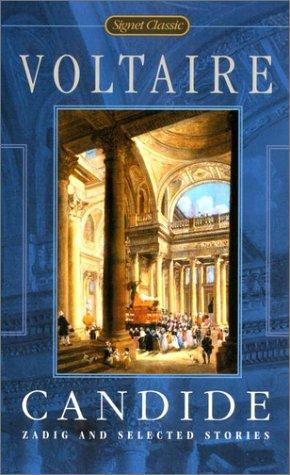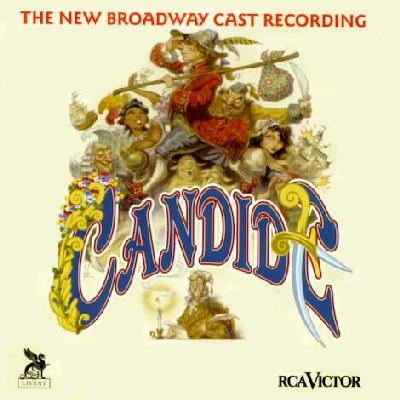
Candide, ou l'Optimisme (pronounced /ˌkænˈdiːd/ in English and [kɑ̃ˈdid] in French) is a French satire written in 1759 by Voltaire, a philosopher of the Age of Enlightenment. The novella has been widely translated, with English versions titled Candide: or, All for the Best (1759); Candide: or, The Optimist (1762); and Candide: or, Optimism (1947). [5] The novella begins with a young man, Candide, who is living a sheltered life in an Edenic paradise and being indoctrinated with Leibnizian optimism (or simply optimism) by his mentor, Pangloss. The work describes the abrupt cessation of this lifestyle, followed by Candide's slow, painful disillusionment as he witnesses and experiences great hardships in the world. Voltaire concludes with Candide, if not outright rejecting optimism, advocating an enigmatic precept, "we must cultivate our garden", in lieu of the Leibnizian mantra of Pangloss, "all is for the best in the best of all possible worlds".
Candide is characterized by its sarcastic tone and its erratic, fantastical, and fast-moving plot. A picaresque novel with a story similar to that of a more serious bildungsroman, it parodies many adventure and romance clichés, the struggles of which are caricatured in a tone that is mordantly matter-of-fact. Still, the events discussed are often based on historical happenings, such as the Seven Years' War and the 1755 Lisbon earthquake.[6] As philosophers of Voltaire's day contended with the problem of evil, so too does Candide in this short novel, albeit more directly and humorously. Voltaire ridicules religion, theologians, governments, armies, philosophies, and philosophers through allegory; most conspicuously, he assaults Leibniz and his optimism.[7][
Source:
http://en.wikipedia.org/wiki/Candide
Candide, The Operetta

Candide (1956) is an operetta with music composed by Leonard Bernstein , based on the novella of the same name by Voltaire. The original libretto was written by Lillian Hellman, but since 1974, has been generally performed with a book by Hugh Wheeler, which is more faithful to Voltaire's novel. [1] The primary lyricist was the poet Richard Wilbur. Other contributors to the text were John Latouche, Dorothy Parker, Lillian Hellman, Stephen Sondheim, and Leonard Bernstein. Hershy Kay, John Mauceri, and Maurice Peress contributed orchestrations.
Candide first opened on Broadway as a musical on 1 December 1956. The premier production was directed by Tyrone Guthrie and conducted by Samuel Krachmalnick.[101] While this production was a box office flop, the music was highly praised, and an original cast album was made. The album gradually became a cult hit, but Hellman's libretto was criticised as being too serious an adaptation of Voltaire's novel. [102] Candide would be more popular seventeen years later with a new libretto by Hugh Wheeler.
Source:
http://en.wikipedia.org/wiki/Candide


Dr. Voltaire explains that Candide was next released from the sack by a band of strolling players and abandoned in Holland. Cunegonde is moved from brothel to brothel until she catches the attention of Issachar, a very wealthy man in Lisbon, and the Grand Inquisitor, who now share her pleasures. Cunegonde sings of her sordid role in life ("Glitter and be Gay").
That's the part I play;
Here I am in Paris, France,
Forced to bend my soul
To a sordid role,
Victimized by bitter, bitter circumstance.
Alas for me! Had I remained
Beside my lady mother,
My virtue had remained unstained
Until my maiden hand was gained
By some Grand Duke or other.
Ah, 'twas not to be;
Harsh necessity
Brought me to this gilded cage.
Born to higher things,
Here I droop my wings,
Ah! Singing of a sorrow nothing can assuage.
And yet of course I rather like to revel,
Ha ha!
I have no strong objection to champagne,
Ha ha!
My wardrobe is expensive as the devil,
Ha ha!
Perhaps it is ignoble to complain...
Enough, enough
Of being basely tearful!
I'll show my noble stuff
By being bright and cheerful!
Pearls and ruby rings...
Ah, how can worldly things
Take the place of honor lost?
Can they compensate
For my fallen state,
Purchased as they were at such an awful cost?
Bracelets...lavalieres
Can they dry my tears?
Can they blind my eyes to shame?
Can the brightest brooch
Shield me from reproach?
Can the purest diamond purify my name?
And yet of course these trinkets are endearing,
Ha ha!
I'm oh, so glad my sapphire is a star,
Ha ha!
I rather like a twenty-carat earring,
Ha ha!
If I'm not pure, at least my jewels are!
Enough! Enough!
I'll take their diamond necklace
And show my noble stuff
By being gay and reckless!
Ha ha ha ha ha! Ha!
Observe how bravely I conceal
The dreadful, dreadful shame I feel.
Ha ha ha ha!
Ha ha ha ha ha ha!





1997 Broadway Revival, The Gershwin Theater
--
Together, we can change the world, one mind at a time.
Have a great day,
Tommy
__._,_.___

No comments:
Post a Comment